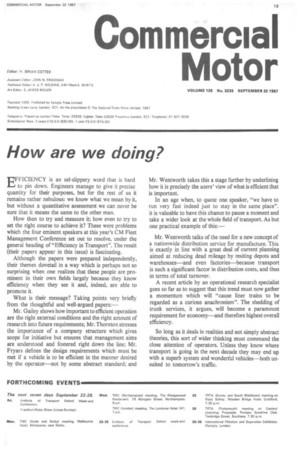How are we doing?
Page 21

If you've noticed an error in this article please click here to report it so we can fix it.
EIFFICIENCY is an eel-slippery word that is hard -Li to pin down. Engineers manage to give it precise quantity for their purposes, but for the rest of us it remains rather nebulous: we know what we mean by it, but without a quantitative assessment we can never be sure that it means the same to the other man.
How then to try and measure it; how even to try to set the right course to achieve it? These were problems which the four eminent speakers at this year's CM Fleet Management Conference set out to resolve, under the general heading of "Efficiency in Transport". The result (their papers appear in this issue) is fascinating.
Although the papers were prepared independently, their themes dovetail in a way which is perhaps not so surprising when one realizes that these people are prominent in their own fields largely because they know efficiency when they see it and, indeed, are able to promote it.
What is their message? Taking points very briefly from the thoughtful and well-argued papers:—
Mr. Galley shows how important to efficient operation are the right external conditions and the right amount of research into future requirements; Mr. Thornton stresses the importance of a company structure which gives scope for initiative but ensures that management aims are understood and fostered right down the line; Mr. Fryars defines the design requirements which must be met if a vehicle is to be efficient in the manner desired by the operator—not by some abstract standard; and
Mr. Wentworth takes this a stage further by underlining how it is precisely the users' view of what is efficient that is important.
In an age when, to quote one speaker, "we have to run very fast indeed just to stay in the same place". it is valuable to have this chance to pause a moment and take a wider look at the whole field of transport. As but one practical example of this:—
Mr. Wentworth talks of the need for a new concept of a nationwide distribution service for manufacture. This is exactly in line with a great deal of current planning aimed at reducing dead mileage by resiting depots and warehouses—and even factories—because transport is such a significant factor in distribution costs, and thus in terms of total turnover.
A recent article by an operational research specialist goes so far as to suggest that this trend must now gather a momentum which will "cause liner trains to be regarded as a curious anachronism". The shedding of trunk services, it argues, will become a paramount requirement for economy—and therefore highest overall efficiency.
So long as it deals in realities and not simply abstract theories, this sort of wider thinking must command the close attention of operators. Unless they know where transport is going in the next decade they may end up with a superb system and wonderful vehicles—both unsuited to tomorrow's traffic.




























































































































